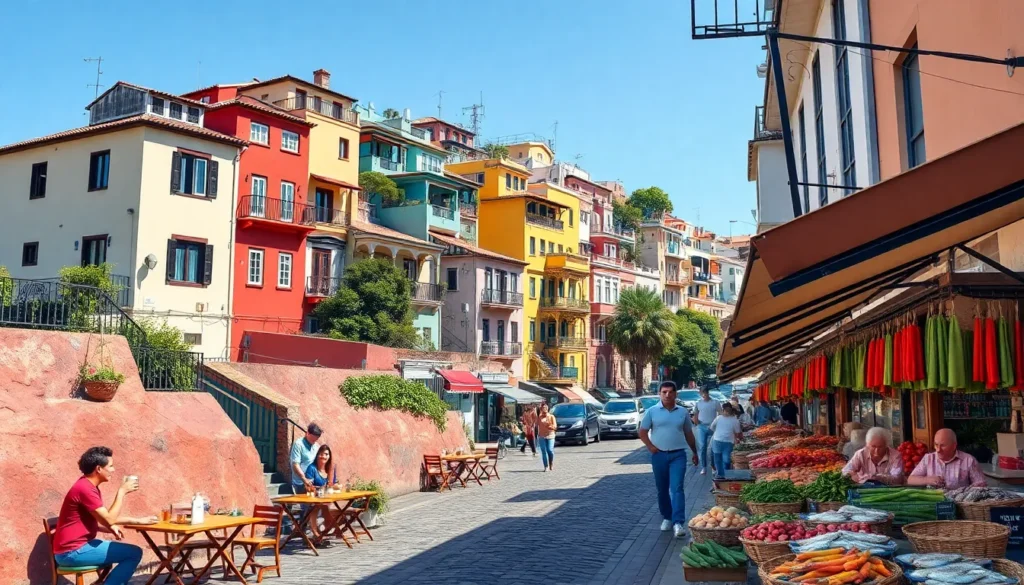Chile, a land of stunning landscapes and vibrant culture, offers more than just breathtaking views and delicious empanadas. With its diverse cities and friendly locals, it’s also a place where the cost of living might just surprise you. Whether you’re dreaming of sipping pisco sours in Santiago or exploring the stunning Patagonia, understanding what it’ll cost to live here is essential.
Imagine trading your overpriced lattes for a delightful café con leche at a fraction of the price. Or picture yourself enjoying fresh seafood straight from the Pacific, all while keeping your wallet happy. The cost of living in Chile can be a delightful puzzle, filled with hidden gems and unexpected bargains. So, let’s dive into the nitty-gritty and uncover what it really takes to live the good life in this South American paradise.
Overview of Cost of Living in Chile
Chile offers a cost of living that varies significantly between regions. Santiago, the capital, generally presents higher expenses compared to smaller cities like Valparaíso or La Serena. Housing costs in Santiago can reach $1,000 for a one-bedroom apartment in the city center, while similar accommodations in Valparaíso average around $600.
Groceries and daily necessities also impact budgets. A monthly grocery bill for one person averages $300, making local markets and supermarkets essential for affordability. Dining out remains budget-friendly, with meals in local restaurants costing around $10 per person.
Transportation in Chile is accessible and economical. Public transport, including buses and metro, typically costs $1 per trip, allowing users to navigate cities without breaking the bank. Owning a car entails higher costs due to fuel prices and maintenance, which average about $4 per gallon.
Healthcare quality stands high in Chile, and costs vary accordingly. Basic health insurance may average $100 monthly, while private options can reach $300. Many expats find the balance of affordable healthcare beneficial in budgeting.
Utilities also contribute to overall costs. Average monthly expenses for electricity, heating, cooling, water, and garbage can range from $100 to $150, depending on usage. Internet service remains relatively low at around $40 per month.
Chile’s lifestyle offers much value. Entertainment, including cinema or cultural events, typically costs $5 to $15. Thus, residents experience a blend of affordability and enriched living. Understanding these costs assists newcomers in making informed decisions about their financial planning in this beautiful country.
Housing Expenses

Housing expenses in Chile vary significantly across different regions, impacting newcomers’ budgets. Understanding rent prices and buying property options aids in making informed decisions.
Rent Prices in Major Cities
Rent prices fluctuate greatly between major cities. In Santiago, a one-bedroom apartment in the city center averages $1,000. Valparaíso offers a more affordable option, with similar accommodations priced around $600. Smaller cities like Concepción or La Serena also provide lower rent options, often ranging from $400 to $700. The neighborhood’s quality directly influences rental costs, with upscale areas commanding higher prices. For individuals seeking shared accommodations, renting a room typically falls between $300 and $500, offering a more budget-friendly alternative.
Buying Property in Chile
Buying property presents diverse opportunities for local and foreign investors. The average price for a standard apartment in Santiago starts around $2,500 per square meter. Coastal cities like Valparaíso and Pichilemu offer competitive prices, often between $1,500 and $2,000 per square meter. Foreign buyers may encounter legal restrictions on purchases but can still navigate the process. Properties in rural areas tend to sell at lower prices, presenting budget-friendly options for those seeking tranquility. Overall, investing in Chilean real estate can yield long-term benefits in growing markets.
Grocery and Food Costs
Grocery and food costs in Chile reflect diverse pricing influenced by location and product selection. Monthly grocery expenses for one person average around $300, showcasing affordability compared to many countries.
Average Grocery Prices
Common items can offer insights into daily grocery expenses. For instance, a liter of milk costs about $1, while a loaf of bread averages $0.60. Fresh fruits, such as apples and bananas, typically range from $1.20 to $1.50 per kilogram. Additionally, local vegetables, like tomatoes and potatoes, are usually priced between $1 and $2 per kilogram. When considering protein options, chicken breasts sit around $4 per kilogram, whereas eggs average $3 for a dozen. Overall, shopping at local markets may yield better deals on produce compared to supermarkets, enhancing affordability.
Dining Out Expenses
Dining out in Chile remains budget-friendly, making it a popular choice among locals and visitors. A meal at a mid-range restaurant usually costs about $10 per person. Fast food options also present affordability, averaging around $5 for a complete meal. Popular dishes, such as empanadas and completo, offer flavor and value, costing around $2 to $5. In contrast, dining at upscale venues can raise costs, with meals averaging $25 or more. Competitive prices for beverages, including local wine or beer, typically range from $3 to $6. Many establishments feature lunch specials that provide substantial savings, further encouraging dining out.
Transportation Costs
Transportation costs in Chile remain accessible and economical, offering various options for both locals and newcomers.
Public Transport Options
Public transport in Chile includes buses, metro systems, and shared taxis known as “collectivos.” Buses operate throughout cities, with Santiago’s extensive network accommodating daily commuters for about $1 per trip. The Santiago Metro covers many routes efficiently, making it a preferred choice for many, with a similar fare structure. Buses may not always adhere to schedules, but their frequency provides flexibility. Collectivos offer a budget-friendly alternative, especially for short distances, with fares ranging from $1 to $2 depending on the route. Overall, public transport provides reliable and cost-effective solutions for navigating Chile’s urban areas.
Car Ownership Expenses
Car ownership in Chile involves various expenses, including purchase prices, insurance, and maintenance. Gasoline prices hover around $1.20 per liter, impacting regular travel costs. Monthly insurance premiums typically range from $30 to $80, depending on the vehicle’s value and coverage. Maintenance costs, including oil changes and repairs, can add $200 to $300 annually. Additionally, parking fees in urban areas may average $100 monthly. While owning a car offers convenience, newcomers often find public transportation a budget-friendly alternative for daily commuting.
Healthcare and Insurance
Healthcare in Chile boasts high quality and affordability, making it appealing for residents and newcomers alike.
Costs of Medical Services
Medical services in Chile remain reasonably priced compared to many countries. A consultation with a general practitioner costs around $40, while specialist visits can range from $50 to $100 depending on the expertise. Basic procedures, such as blood tests, generally start at $20. If hospitalization is necessary, average costs per day in a private hospital hover around $300. While these rates reflect private healthcare options, public healthcare services often charge significantly less.
Health Insurance Options
Health insurance options in Chile provide comprehensive coverage tailored to individual needs. Private insurance plans start at approximately $100 per month, covering a broad range of medical services, including consultations and treatments. Many people opt for a mix of public and private health insurance for additional benefits. Public insurance, known as FONASA, offers lower costs, with premiums based on income. With various plans available, potential users should compare coverage details to find the best fit for their healthcare requirements.
Education Expenses
Education expenses in Chile vary significantly across different levels of schooling. Families can choose from public, private, and subsidized private institutions. Public schools offer free education, while private schools can charge between $200 and $1,500 per month, depending on the institution’s reputation and facilities. Subsidized private schools provide a balance, with costs typically ranging from $100 to $700 monthly. Parents often explore options to find the best fit for their children’s education.
Schooling Options and Costs
In Chile, schooling options include public, private, and semi-private (subsidized) schools. Public institutions provide free education for students but may face challenges with resources. Families often prefer private schools, which charge fees from $200 to $1,500 per month, attracting students through smaller class sizes and better facilities. Semi-private schools combine public funding with tuition, making them affordable while maintaining quality education. Each choice has distinct advantages, impacting overall education costs.
University Tuition Fees
University tuition fees in Chile can vary widely, reflecting the type of institution. Public universities charge lower tuition, averaging $1,000 to $2,500 annually for Chilean students. Private universities, however, often demand higher fees, ranging from $4,000 to $10,000 per year. Scholarships and financial aid programs help ease financial burdens for eligible students. Both public and private institutions offer quality education, influencing student preferences based on budget and career goals.
Chile offers a unique blend of affordability and quality of life that appeals to many newcomers. With diverse cities like Santiago and Valparaíso providing various living options, it’s possible to find a comfortable lifestyle without breaking the bank. Affordable dining, accessible transportation, and high-quality healthcare contribute to an inviting atmosphere for both residents and expatriates.
Understanding the regional differences in costs can help individuals make informed decisions about where to live and how to budget effectively. Whether exploring the vibrant culture or enjoying the stunning landscapes, newcomers can appreciate all that Chile has to offer while maintaining a balanced financial outlook.













